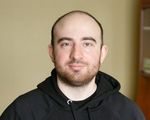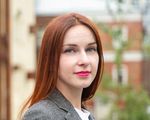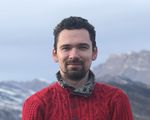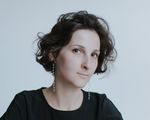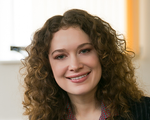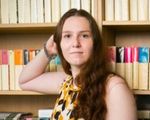About the project «Success Builder»
How do you find your place in life? How do you find something to do that both comes naturally to you and makes you happy? The answer is that you have to apply the knowledge you’ve gained from university and from life itself correctly. The Success Builder Project features HSE University graduates who have discovered themselves through an interesting business or an unexpected profession. The protagonists share their experiences and lessons learnt and talk about how they’ve made the most of the opportunities they were given.
Study at HSE University, then go to Oxford and on to Yale to plumb the full depths of economics as a social science—that is the path that Dmitry Aksakov, graduate of the ICEF bachelor’s programme and now head of ESG Banking at VEB.RF has followed. In this interview with Success Builder, he explains how Mick Jagger helped him choose a university, why employers themselves seek out Oxford students, what ‘green investing’ is and how working with it can change your lifestyle.
Economics is part of your family tradition. Did your parents play a role in your choice of HSE and ICEF?
I think it was a combination. My father graduated from the Economics Department of Moscow State University and told me that economics is both a humanitarian discipline and exact science. One of his professors there was Sergey Yakovlev, who is the current ICEF director. ‘You’ll definitely like it,’ my father said. ‘At least take a look at it.’ During my last three years of high school, I didn’t know what I wanted to be but felt I was more a mathematician than a poet. In fact, with its mathematical foundation, economics also leaves some room for creativity that I really liked.
While attending an HSE University preparatory course during my final year of high school, we received visits from ICEF representatives, including Jeffrey Lokshin who gave an inspiring talk about the University of London [ICEF bachelor’s programme students can also earn a degree from the University of London — ed. note]. That floored me—one of my music idols, Mick Jagger, had been a London University student, although not a very good one. I paid no attention to the fact that other LU alumni included George Soros and Nelson Mandela. I was 16 years old: Jagger beat out everyone else.
Regarding poetry, which aspects of economics strike you as humanitarian?
Economics is primarily about people. The numbers and economic statistics that we see are the results of relationships between people. For example, why do prices rise? During the pandemic, people are afraid and buy up sugar and toilet paper. This is a story about feelings. On the stock exchange, prices fall sharply in response to cataclysms and wars. Any threat to life or reminder of human fragility instantly resonates with the market.
In another example, news of the vaccine has spurred increased economic activity, businesspeople have become bolder and we see positive dynamics in the stock markets. Economics has always seemed like a very human-centred science to me.
All the figures and graphs really represent people, and we should remember this when making economic policy
When I studied at ICEF and later as well, I always tried to explain all sorts of economic patterns to myself through stories of real people who participate in the market. For example, if GDP goes up, it means that industrialists have faith in the future and the country’s development, and so they boldly open new production facilities.
Which authority figures influenced your choice of a profession?
My father. Also, I have always admired entrepreneurs, people of action who are willing to create something outstanding and global from scratch. I mastered computers as a teenager and was amazed that the Windows system — that ubiquitous and very user-friendly interface — was created by an actual person, Bill Gates. And when I graduated from ICEF, the first iPhone appeared, and I began studying what kind of company it who Steve Jobs was and how he brilliantly combined many different computer and communication technologies.
At the same time, many of my classmates took internships at very well-known international companies, including consulting firms and investment banks. From this first-hand information, I began to get an idea of what I really wanted to do. This was when investment banking captured my attention.
Wouldn’t you like to try your hand as an entrepreneur?
Definitely, and even now, when I have worked at several major businesses — Deutsche Bank, UBS and VEB — I find myself wanting to start something new and not simply carry out transactions or processes along established lines. In whichever organisation I have worked, I have always tried to create something new: at Deutsche Bank, I actively developed the work with small and medium-sized banks, at UBS I worked on using AI to automate business processes, and at VEB I finally plunged into the new environmental field, laying the groundwork for developing this innovative field. Now I have become a business leader in the global effort towards sustainable development. This is important for me. Later, I might focus on something less ‘earthshaking’ and more personal.
After graduating from ICEF, you studied at two of the most prestigious Western universities. Was it so easy to get into Oxford and Yale after HSE University? And why did you go to Oxford first?
ICEF is essentially a Western university. Classes are taught in English and we used international textbooks to study such key subjects as macro- and microeconomics, mathematics, statistics, philosophy and economic history.
I didn’t think about it while I was a student, but it turned out that as an ICEF graduate I was well prepared to enter Oxford and to do well there
There was nothing out of the ordinary for me in earning a foreign master’s degree and MBA, and later working in a foreign bank. It turned out that I had been educated in much the same academic traditions as my colleagues. ICEF played a major role in my success: they prepare people perfectly to be able to integrate into international organisations. At the same time, you aren’t divorced from the realities of the Russian market. Having completed that global educational track, you are doubly prepared to contribute to the domestic economy.
I chose Oxford because it was in fashion among successful students. The best students from my course went to the London School of Economics. Four others went to Oxford and several more when to Cambridge, Warwick and Columbia University. I submitted my application along with my classmates and dreamed of studying at such a legendary university. I was hoping for something new and exciting. Yes, I had some anxieties, but I had no doubts about myself or my ‘local’ education. The knowledge I had gained turned out to be more than sufficient to study and to start a career — after all, British master’s programmes last only one year and I had to think about starting my professional career. It just so happened that I had very capable classmates, and so HSE motivated me to conquer the world’s universities without fear.
What unique experience did you expect to get from Oxford given that it is a university covering every field and doesn’t specialise in economics?
The academic environment is the main strength of that university. Oxford puts you in contact with a centuries-old university tradition and enables you to draw inspiration from the same place where outstanding thinkers studied and taught. Unlike universities that specialise in economics or finance, you gain access to people with the widest possible range of interests. Although you study with economists, you communicate with students from all 39 Oxford colleges. The social life there is such that you constantly and pleasantly cross paths with students of biology, history, philosophy and political science. This contact literally gives you an education in all areas, giving you an incredibly integrated view of the world and a critical understanding of everything that happens in life.
My neighbours in the dormitory where I lived studied political science, geography and history, and yet we all attended events at our very different departments together. This huge network of contacts allowed me to meet people from all areas of business and science, gain a clear understanding of how to start a career and make meaningful life decisions. Oxford has a wonderful tradition, the Oxford Union debate club, in which students regularly debate various topics and develop their rhetorical skills. The club hosts famous speakers, ranging from heads of state to poets, scientists and actors, and this greatly affects your worldview and outlook.
You had to look for a job. What were your thoughts in this regard?
After my third year at ICEF, I went to Deutsche Bank in Frankfurt for the summer and witnessed the incredibly interesting and dynamic world of finance. I was amazed at how smart and motivated my colleagues were and I wanted to work in investment banking with them, to be as confident and competent as they were.
I planned to start working after finishing my master’s degree and I had to look for positions immediately after admission because in both banking and consulting, the hiring process begins in the fall. In other words, to be able to begin working in the summer, I had to start sending out my résumé just one month after my studies began. That’s a lot of stress: you are getting used to a different city, to new people, a new schedule and unfamiliar methods, and you also need to contact potential employers and put your best foot forward. On the other hand, having survived this difficult period, you can enjoy your studies and university experience twice as much in the knowledge that a very good future awaits you after graduation.
Oxford is one of the most recognisable academic brands in the world, and so it gave a significant boost to my career. We were not sent out to meet with companies: the companies themselves came to campus and recruited students there. These included such banks as UBS, Goldman Sachs, Morgan Stanley and Deutsche Bank, as well as the consulting companies Deloitte, BCG and McKinsey. I chose Deutsche Bank because they already knew me there to some extent and I went to work for them in London right after graduation.
Why wasn’t Oxford enough? Why did you earn another degree from Yale?
Before you begin working, your studies are still abstract: you don’t know yourself yet and how your knowledge can be applied.
An MBA enables you to find answers to questions of a professional nature and to develop the interesting facets of who you are — which only emerge in the work environment
It was at Deutsche Bank that I understood that I really like communicating with people, explaining things and finding the best solutions. My job was like working in sales, so I had to learn the art of presenting a subject in great detail, and this came naturally to me. This led to a need for specific knowledge of macroeconomics and the policy of central banks. I wanted to try to understand everything in a structured academic environment under the guidance of leading academics.
Why Yale specifically? It is no less legendary than Oxford University. It is a member of the Ivy League but with a strong social aspect. The mission of the Yale Business School expresses this directly: the university transmits knowledge not for the sake of making money, but for graduates to care for and improve society. This is close to my heart because I have long wanted to see economics as a more humanitarian science. For example, I was happy to start studying Asia, not only its economy but also its culture. I studied Chinese for four semesters and took courses in philosophy, history and the art of communication.
Yale gave me a liberal arts education that proved a very valuable addition to my ability to build financial models. I also gained social insights from the students themselves: contrary to the stereotype, members of all social strata, cultures and identities study at Yale. Our class consisted of 326 people from more than 40 countries who were involved in a wide variety of interests and fields — actors, politicians, businesspeople, consultants, bankers and musicians.
It is interesting to compare Western European and U.S. scholastic traditions. What are the main differences at the university level?
Of course, Yale and other U.S. universities are scholastic through and through, but the history of the continent and political factors have had an effect. European and U.S. universities have very international student bodies, with students from literally all over the world. But the American educational system is more flexible than the British one and, unlike Oxford, where undergraduates are very limited in their specialisation, it allows them to supplement the curriculum and develop in greater breadth.
Even the British master’s degree is somewhat mechanical in that you cannot deviate from your chosen path. Of course, this guarantees a high-quality education in your narrow field. In other words, you can’t take courses like art or history if you’re studying for a master’s degree in economics. At Yale, however, at both the undergraduate and MBA levels, you have total freedom in your academic path. I could take acting and philosophy courses and I used that opportunity and enjoyed them.
What career opportunities does an MBA give you?
When a person graduates from a university like Yale, a very wide range of very prestigious employers takes notice. And, as is the case with Oxford, employers try to recruit them while they are still students. My studies at Yale began in August. By December, I already had an offer from UBS, where I ended up working for two and a half years.
What prompted you to trade UBS for VEB and New York for Moscow?
There were several reasons. I wanted to be closer to my family. That is important to me. The other reason is that VEB offered me a position in which I could develop along business lines by developing and implementing new products from scratch. This new field for VEB was rooted in a deep social dimension. It gave me an incredible scope for activity and the opportunity to combine the joy of being with my family and realising my entrepreneurial inclinations. And the third reason is that I always knew I would return to Russia. This is my home. I feel good here.
What do you do at VEB and what is ESG [Environmental/Social/Governance – ed. note] financing?
My position is called Head of ESG Banking. In essence, I run a division in the Business Block that deals with VEB environmental and social projects. The ESG field is developing rapidly all over the world now, as society pays a great deal of attention to the issue of conscious consumption. In turn, investment funds respond to the extent to which companies are environmentally friendly and demonstrate concern for society.
We have seen that in Russia there are companies that declare their environmental policy publicly and issue ‘green’ bonds and that various ministries have introduced eco-initiatives. VEB decided that the ‘green’ initiatives should be consolidated and that there should be a methodological centre of sorts that would develop concrete criteria for sustainable development projects throughout the whole country, and not only locally.
For example, in 2020, we worked on a document called ‘Taxonomy’ that is essentially a list of areas of ‘green’ business activity. These include renewable energy, improving energy efficiency, reducing harmful emissions, reusing raw materials — particularly with industrial water treatment — and other issues. Now, together with the government, we have started developing specific measures to support companies financially that carry out environmental initiatives, and we hope this programme will motivate firms to become more environmentally friendly.
How much have the events of 2020 changed the bank’s plans? At the very least, one of the keywords of 2019 — ‘ecology’ — has been eclipsed by such words as Zoom, vaccination and social distancing.
We were not taken seriously even at the end of 2019 when we started to deal with environmental issues at the level of financial policy. But in 2020, everyone is talking about environmental and social responsibility. So, to the contrary, the situation has given us added impetus. People and the value of human life filled the headlines, and everything we do primarily concerns each individual personally — his or her health, well-being, comfort and, to the same extent, the harmony of indoor spaces where people have begun spending so much time.
This social aspect has taken on importance in every area — it pertains to psychological health, the availability of medical care and concern for citizens’ well-being. You would think that environmental issues would take a back seat during the pandemic. However, the EU, and especially France, Germany and the Scandinavian countries, as the leaders of the environmental movement, set the standard for the whole world. They have introduced a ‘carbon tax’ — that is, they will impose additional duties on goods that do not meet EU environmental requirements. What’s more, the EU is the largest trading partner for Russia and as well as other countries. Our businesses will have to adapt to this and, in turn, this will prompt financial institutions to develop new programmes to support the market.
How do you organise your personal life to fit into this ecological paradigm?
Of course, when I became the head of a new business division at VEB, I examined my own life carefully to see how much I lived according to the ideals we are trying to promote. Every bit of data on this topic prompted me to analysis. I paid attention to everything: what my clothes are made from, whether they are made by children living in poor countries, how much I really needed these things and whether I could have them recycled, how environmentally friendly the production practices are of the company from which I regularly buy coffee, what sort of bag I carry my groceries in, etc. I began to see far more than before and felt personally responsible for the fact that I, and not someone else, can sort my garbage and use resources more economically. And this is very simple and pleasant to do. I’m thinking about buying an electric car, not for the sake of turning heads, but to set an example and demonstrate where I stand on environmental issues. And more broadly, to make eco-transport more than just a ‘gesture’, but a part of everyday life.









